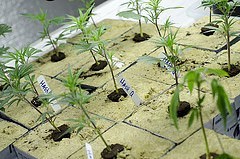Pennsylvania may legalize the use of marijuana for medicinal purposes. If passed, Senate Bill 1182, known as the Compassionate Use of Medicinal Cannabis Act, will join 21 other states, including Washington, D.C., that have already passed medicinal marijuana laws. According to the organizations Marijuana Policy Project, SB 1182 “will protect Pennsylvanians with serious and debilitating medical conditions from arrest for using and obtaining medicinal marijuana with their doctors’ recommendation.”

Marijuana photo by Bret Levin
Conservative San. Mike Folmer (Republican) is cosponsoring the medicinal marijuana law with longtime supporter, Sen. Daylin Leach (Democrat). The bill, which was released on January 15th earlier this year, aims to legalize cannabis for residents of Pennsylvania who have been recommended by “a physician, registered nurse practitioner, dentist or psychiatrist who has completed a full assessment of the patient’s medical history and current medical condition, including a personal examination.” The bill specifically articulates that the patient can only receive a recommendation for medicinal marijuana from a physician with whom he or she already has “bona fide medical professional-patient relationship,” which should provide for the patient’s demonstrated need for the medicinal treatment of cannabis.
Why So Many Support Legalization in PA
Supporters of the bill argue that marijuana has many medicinal properties, serving as an anti-inflammatory and painkiller, and is better for the body than prescriptive narcotics that contain harsh chemicals with drastic side effects. Marijuana even has the potential to help save severely sick children with a particular strain called “charlotte’s web“. Furthermore, supports of SB 1182 argue that while marijuana does run the risk of being abused, so do other prescriptive narcotics. According to Sen. Folmer, “we’re not talking about banning OxyContin, we’re not talking about banning Percocet, we’re not talking about banning Vicodin. If you’re going to say that we’re afraid of the misuse of medical marijuana, you’ve got to use that same philosophy and ban all the others also.”
While marijuana is known for being a recreational, hallucinatory drug, the Cannabis plant from which marijuana is derived, contains different forms of cannabis that perform different functions. For instance, parts of the plant contain high levels of Tetrahydrocannabinol (THC), which is the principal psychoactive constituent of the cannabis plant. Other parts of the plant contain higher levels of cannabinoid, which have medicinal properties and not hallucinatory.
SB 1182 directly states that the only acceptable forms of medicinal marijuana are strains that do not have psychoactive properties. Such as “Cannabidiol” or “CBD,” which, according to the bill, is “a main cannabinoid present in the naturally growing populations and in the industrially cultivated varieties of Cannabis sativa L which is not psychoactive and has several pharmacological properties, including acting as a powerful anti-inflammatory, neuroprotective and antioxidant compound.” By stipulating which forms of cannabis are acceptable for the use of medicinal marijuana, the bill is attempting to deter individuals from using marijuana for recreational purposes by enforcing that only particular strains of the plant be used. The bill also allows for medicinal marijuana in form of “cannabis concentrate,” which is extracted oil from the usable cannabis flower, and “cannabis flower.”
How Will SB 1182 Change Marijuana Policies in Pennsylvania?
SB 1182 will only change marijuana laws to allow for the use of medicinal marijuana, only for authorized patients. Otherwise, marijuana laws will remain status quo. There are marijuana laws regarding penalties for the possession, sale, and cultivation of marijuana, and for the possession and manufacture of hash and concentrates.
Currently, marijuana laws for possession and sale or distribution are as follows:
Possession:
- For possession of 30g or less, the penalty is a misdemeanor, a possible sentencing of up to 30 days in jail, and a fine of up to $500.
- For possession of more than 30g, the penalty is a misdemeanor, a possible sentencing of up to 1 year in jail, and a fine of up to $5,000.
Sale or Distribution:
- For sale or distribution of of 30g or less for no remuneration, the penalty is a misdemeanor, a possible sentencing of up to 30 days in jail, and a fine of up to $500.
- For sale or distribution of 2-10 lbs., the penalty is a felony, a minimum of 1 year in sentence, and a fine of up to $5,000.
- For sale or distribution of 10-50 lbs., the penalty is a felony, a minimum of a 3-year sentence, and a fine of up to $25,000.
- For sale or distribution of less than 1000 lbs., the penalty is a felony, a minimum of a 3-year sentence, and a fine of up to $25,000.
- For sale or distribution of more than 1000 lbs., the penalty is a felony, a minimum of a 10-year sentence, and a fine of up to $100,000.
Even though the aim of SB 1182 is to allow approved patients the opportunity to take marijuana as an alternative to prescriptive narcotics, there are many people who question whether or not changing the law will actually protect those who are legally allowed to consume and possess the substance. According to Philly.com, states like New Jersey – which already observe medicinal marijuana laws – are still charging cardholding medicinal marijuana patients with possession, despite the fact that their state observes marijuana laws.
SB 1182 is intended to help sick Philadelphians in need of relief from pain, inflammation, and seizures. If the bill passes, hopefully it will do just that, but only time will tell if the medicinal marijuana bill becomes a progressive, and much needed, medicinal marijuana law.
Did you find this article helpful?


